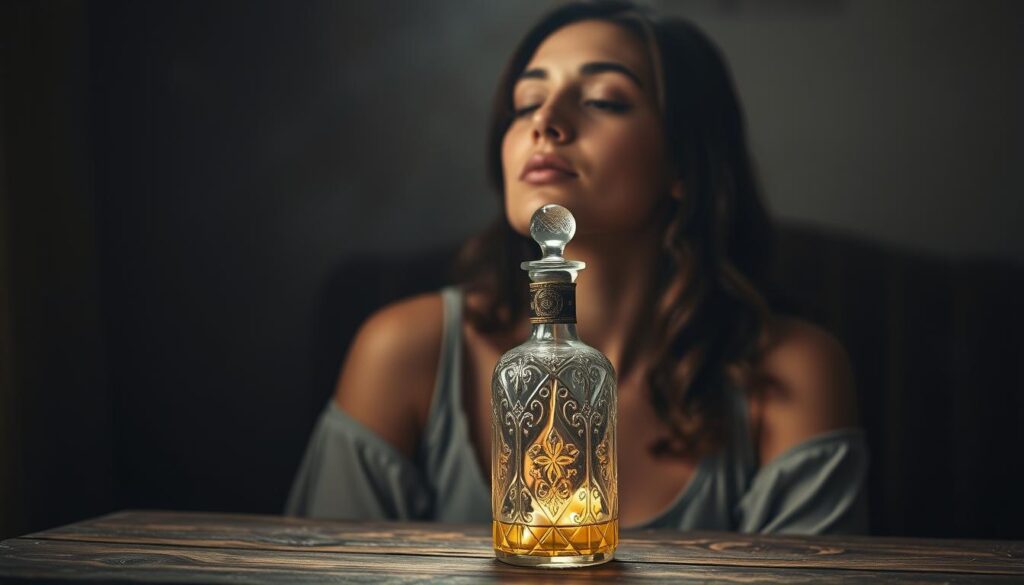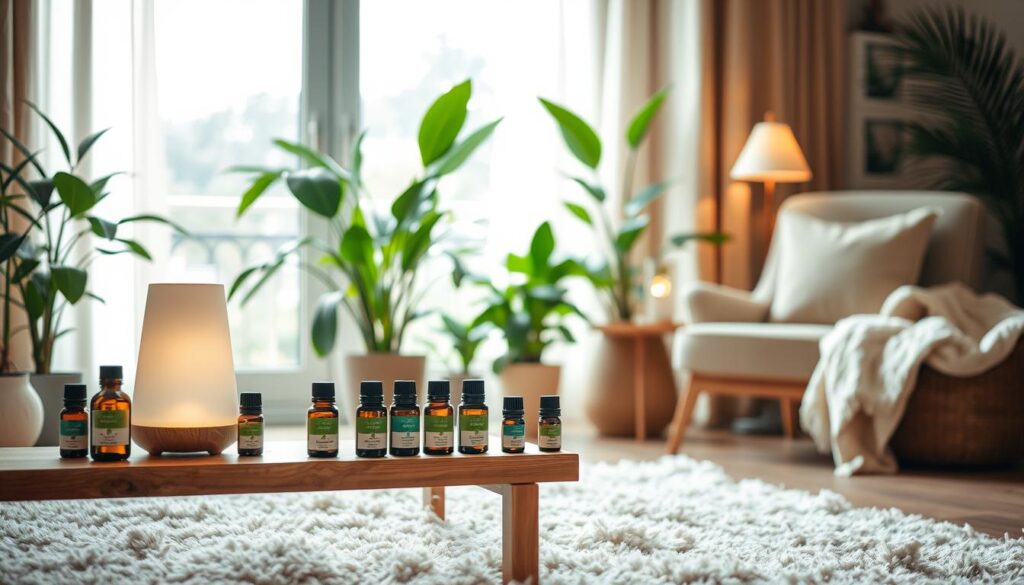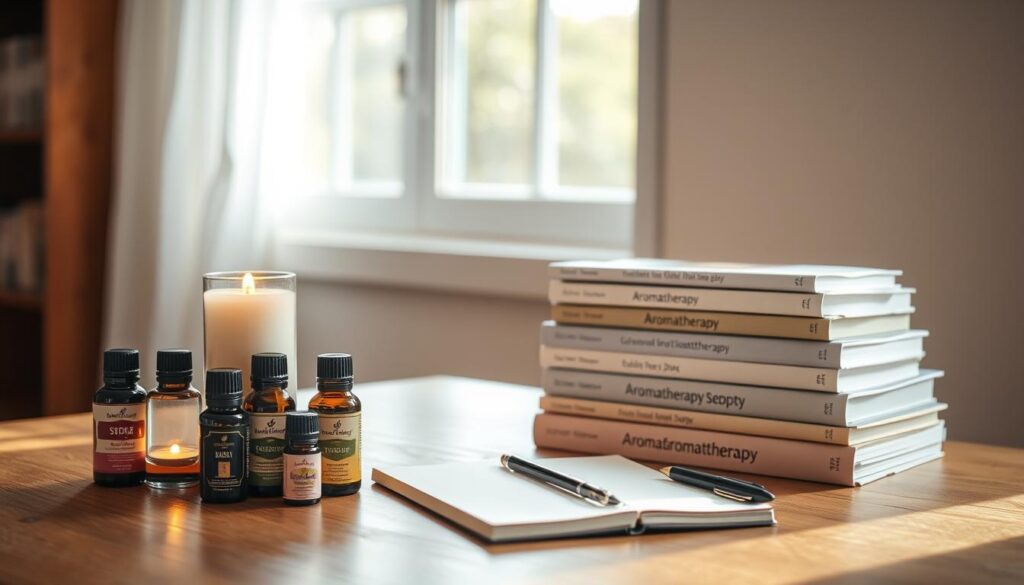Scents impact our lives more than we often realize. The smell of fresh flowers or the aroma of coffee can brighten our day. It’s all about the psychology of scent. Each breath can take us away, lift our mood, or give us a break from life’s hard times. The power of scent works wonders on our emotions through aromatherapy. Our sense of smell links directly to our memories and feelings, creating stories from our daily scent experiences.
The ability of the human brain to recognize a trillion odors shows how complex our sense of smell is. Scents like vanilla’s warmth or citrus’s zest shape our emotions and thoughts. Scent marketing uses this to influence how we feel in different spaces, like using lavender to relax at home or eucalyptus to energize in the office.
We invite you on a journey to discover how scent and mind connect. This bond has fascinated people forever, showing how scents change our moods, help businesses grow, and improve our emotional health.
Key Takeaways
- Scents have a direct pathway to the brain’s limbic system, influencing our emotions and mood regulation.
- Aromatherapy benefits span from enhancing relaxation to improving focus, with essential oils like lavender and eucalyptus leading the way.
- Scent marketing leverages olfactory receptors to transform customer experiences and drive brand recall.
- Fragrances play a strategic role in creating ambiance in both personal spaces and shared commercial environments.
- Personalized fragrances offer an intimate approach to boosting emotional well-being through tailored scent preferences.
- The ongoing popularity of scented candles and essential oils reflects the growing awareness of aromatherapy’s role in daily life.
Understanding Aromatherapy and Its Origins
The journey into the history of aromatherapy shows us a deep connection between ancient traditions and today’s holistic healing. Using essential oils from plant extracts for health is an old practice. It goes back thousands of years, linking nature with our well-being.
Aromatherapy has roots in ancient Egypt and traditional Chinese medicine. It has always been part of healing in many cultures. This mix of art and science not only teaches us about old healing ways. It also shows us its value in today’s focus on wellness. Learning about the main ingredients in aromatherapy helps us appreciate and understand their ongoing significance.
The History of Aromatherapy
Aromatherapy started over 3,500 years ago, based on records from 5,000 to 10,000 BC. People all over the world used aromatic plants in sacred rituals, for embalmment, and to treat health issues. Oils were highly valued in ancient cultures like the Egyptians, Chinese, Greeks, Romans, and Indians. They used them not just for health but for spiritual needs too.
Texts like the “Yellow Emperor’s Classic of Internal Medicine” from China and the use of frankincense and myrrh in Egypt show early uses of aromatic oils. The term “aromatherapy” was coined by René-Maurice Gattefosse in 1935. He discovered how lavender oil could heal burns.
Key Ingredients in Aromatherapy
The power of aromatherapy comes from its key ingredients: strong essential oils from plants. Each oil has special healing properties. For example, lavender is loved for its scent and its calming and sleep-improving effects.
Peppermint helps with digestion and nausea, while eucalyptus acts as a decongestant. These oils improve our physical and emotional health, showing the essence of holistic healing. By exploring these ancient but still relevant methods, we connect with nature’s healing powers.
How Scent Influences Mood
Understanding how scent affects our feelings starts with our olfactory system. Scents go straight to the limbic system, affecting our emotions and memories. This connection changes our emotions and mood.
The influence of scent on mood isn’t just about nice smells. It’s about how scents release serotonin and dopamine. This increases happiness and calmness. Scents can help us reach a better mood and emotional state.
The Science Behind Smelling
Learning how scent affects mood starts with the basics. When we smell something, molecules interact with receptors in our nose. These signals go straight to the brain part that handles emotions. This affects our feelings and actions in deep, often unnoticed ways.
Emotional Responses to Fragrance
Different fragrances trigger different strong emotions. For example, lavender is known to decrease stress and improve sleep. Lemon and other citrus smells can boost spirits and focus. These effects show why essential oils are used to create positive emotional states.
Knowing how fragrances work opens many doors for our well-being. Using what we know about perfumes, we can make spaces smell nice and feel good. This can help our well-being and productivity.
Popular Essential Oils and Their Effects
Aromatherapy introduces us to essential oils that are not just fragrant. They also provide great benefits for our minds and bodies. Lavender, citrus oils, and eucalyptus are particularly notable. They help with relaxation, energizing, and mental focus.
Lavender oil is often called the “mother of aromatherapy” because it’s so versatile and gentle. It’s great for calming and reducing stress. Studies show it can lessen headache pain and help with better sleep.
Citrus scents, like lemon and orange, are full of energy. They wake you up and keep you alert. Great for fighting off tiredness and staying sharp. Lemon oil, for example, has been found to help brain function in people with Alzheimer’s disease.
Eucalyptus aroma is known for its clear, fresh scent. It’s good for breathing health and staying mentally alert. It’s also useful for keeping focus in busy settings. Plus, eucalyptus has properties that fight microbes, though this is mostly seen in lab studies.
Want to know more about how different essential oils can help? Check out this handy guide on essential oils benefits and uses.
But, it’s vital to be careful with essential oils. They’re powerful and can strongly affect the body. For example, oils from citrus can make your skin sun-sensitive, leading to burns. And oils like eucalyptus might be harmful to pets. Always dilute them well and use them sparingly to stay safe.
Essential oils like lavender, citrus, and eucalyptus offer natural solutions for calm, energy, or focus. Using these oils mindfully maximizes their health benefits. Always use them wisely to enjoy their healing properties.
The Role of Scent in Memory
The connection between scent and memory, known as the Proustian effect, shows how our sense of smell is closely linked with remembering past events. Certain smells remind us of past times and strongly trigger our emotions. This happens because the olfactory bulb sends info straight to the brain’s part handling emotions and memories.

Research tells us that triggering memories with scents is more than just recalling the past. It can bring up many feelings, sometimes more strongly than sounds or sights do. For example, smelling lavender might make us feel relaxed because it reminds us of a calm evening at home.
| Study | Findings |
|---|---|
| Matsunaga et al. (2013) | Odor-evoked nostalgia increased feelings of nostalgia 6.5 times more compared to control fragrances. |
| Reid et al. (2015) | Nostalgic scents elicited three times more positive emotions than negative ones. |
| Masaoka et al. (2012) | Odors that evoked autobiographical memories promoted deeper and more relaxed breathing. |
Scent-driven memories create a deep emotional connection. They’re not just stronger but also tied to specific times in our life. Studies show we mostly form these memory scents in early childhood when the smell is super important for understanding the world.
Scent in memory recall has great potential, not just for remembering but also in therapy. Certain scents can decrease stress, lower cravings, and comfort in conditions like Alzheimer’s or Parkinson’s. This makes olfactory cues incredibly useful for improving well-being and emotional health.
We invite you to explore how scent can enhance both recalling cherished memories and making new, emotionally significant ones. Use the strong bond between fragrance and memory to turn everyday moments into unforgettable experiences.
Utilizing Aromatherapy in Daily Life
Using aromatherapy every day can make our lives better. It helps us relax at home and be more productive at work. The power of essential oils is key to this. They create places that help us feel good and relieve stress.
Creating a Relaxing Atmosphere at Home
At home, aromatherapy can turn our spaces into peaceful retreats. Imagine your evening filled with the calming scents of lavender or chamomile. These smells can wash away the stress of the day. Aromatherapy at home is more than a treat; it’s a path to feeling better, both emotionally and physically. Studies have shown that lavender oil can really help us relax and sleep better.
Aromatherapy in the Workplace
In the workplace, energizing aromas can make a big difference. Oils like peppermint and lemon clean the air and wake up our minds. This can make us focus better and work more efficiently. It’s great for any job that wants to cut down on tiredness and up productivity. Studies say that smelling lemon oil can make people feel better and less stressed at work.
Understanding the wide array of essential oils and their uses can really help us. They can enhance our lives both at home and work.
| Essential Oil | Common Uses | Benefits |
|---|---|---|
| Lavender | Stress relief, sleep enhancement | Calms the nervous system, improves sleep quality |
| Peppermint | Enhancing concentration, digestive health | Relieves IBS symptoms increases alertness |
| Lemon | Mood enhancement, cleaning | Boosts mood and immune system, natural disinfectant |
| Tea Tree | Acne treatment, antiseptic | Antibacterial properties promotes skin healing |
By making aromatherapy part of our daily routine, we can create spaces that support our well-being. As we learn more about how to use these oils, we can lead more balanced and peaceful lives.
The Benefits of Aromatherapy for Mental Health
People all over the world use aromatherapy for stress relief and anxiety reduction. They know it really helps improve mental health. Studies and stories from people show that essential oils and scents from plants can help us feel more emotionally stable and healthy.

In today’s fast-paced life, it’s crucial to take care of our mental health. This is especially true as more people feel anxious and stressed. Aromatherapy offers a natural and easy way to relax and feel better emotionally.
Reducing Anxiety and Stress
Research has proven that aromatherapy helps reduce anxiety and stress for many people. One important study showed that people felt much less anxious after aromatherapy massages. Their anxiety levels dropped from a score of 41.2 to 34.1 after the massage. This shows how aromatherapy can really help with anxiety reduction.
Enhancing Focus and Productivity
Aromatherapy can also make us more focused and productive. This is thanks to certain oils like peppermint and rosemary. These scents help improve our concentration and how well our brain works. Using these oils at work or while studying can help us pay better attention and do better at our tasks. This links focus enhancement to better productivity.
Learning more and researching about aromatherapy confirms its traditional benefits. It also encourages us to use it more in our everyday lives. This helps us achieve better mental health and overall wellness.
Choosing the Right Fragrance for You
Finding your perfect fragrance is both an art and a science, tied to our personal scent preferences. It’s more than picking a smell; it’s about how your scent tells your story and holds memories. With 70% of people looking for scents that show who they are, knowing what you like is the first step in choosing fragrances.
Understanding Personal Preferences
Everyone is different, and that includes what fragrances they like. It could be the bright smell of citrus or calming lavender that suits your style and personality. Since 80% say scents affect their mood, the fragrance you choose is really important.
What feeling do you want your scent to bring? Confidence, calmness, or energy for work? This can guide your choice. Fragrances can be versatile—light floral for the day or warm for the night. Each scent choice is a chance to express and boost your mood. A good 85% of people think about the occasion when picking a scent. It shows how we can match our fragrances with different parts of our lives.
Tips for Blending Oils
Creating your own scent involves blending essential oils. This makes your fragrance complex and unique. Start with basic smells and add layers. Half of users enjoy mixing scents to make them their own.
- Use base notes like rich musk or earthy wood as your fragrance foundation.
- Add middle notes that complement your base, like floral or fruity smells.
- Finish with top notes, which are light and the first thing you smell.
The way you apply your fragrance can also make it more interesting. Skin type plays a role, with 65% noting that scent lasts longer on oily skin. Putting perfume on your wrists or behind your ears can also make your scent evolve throughout the day.
| Fragrance Type | Recommended For |
|---|---|
| Extrait De Parfum | Special Events, Long-lasting Impact |
| Eau De Parfum | Everyday Wear, Durable Scent |
| Eau De Toilette | Casual Outings, Subtle Scent |
When picking the right fragrance, think about the weather. It really changes how a scent feels. From soft floral for work to warm vanilla for evenings, exploring fragrances is a fun journey. Choosing and mixing scents carefully enhances more than just how you smell. It boosts your mood, well-being, and how you express yourself.
Safety and Precautions in Aromatherapy
Aromatherapy safety is essential for a safe and enjoyable experience. It includes following dilution guidelines. It’s important to enjoy the scents safely to avoid bad reactions.
Guidelines for Safely Diluting Essential Oils
Knowing how to dilute essential oils properly is key. These powerful extracts need to be handled with care. Keep the essential oil concentration under 5%.
For adults, a 1% dilution rate is generally safe. This equals about six drops of essential oil per ounce of carrier oil. Below is an easy guide:
| Essential Oil | Common Safe Dilution Rate |
|---|---|
| Lavender | 1% |
| Tea Tree | 1% |
| Peppermint | 0.5% |
| Eucalyptus | 0.5% |
Identifying Potential Allergens in Essential Oils
Being aware of allergens in essential oils is crucial. Some scents can cause skin irritation or more serious health issues. Oils like cinnamon bark may irritate mucous membranes and must be used with caution.
- A patch test on a small skin area can reduce risks.
- Make sure your space is well-ventilated when using oils.
- Avoid camphor, parsley seed, and pennyroyal during pregnancy.

By taking these precautions, you can enjoy aromatherapy’s wellness benefits without the risks. The key is to be informed and careful. This way, we keep aromatherapy effective and safe for everyone.
The Future of Aromatherapy
Aromatherapy is growing fast both in scent trends and health benefits. It’s vital for holistic health today. The market might hit $5.7 billion by 2032. This rise comes from more folks wanting natural products and understanding their health impacts better.
There’s a big jump in aromatherapy product innovation lately. It’s getting popular in homes, healthcare, and personal wellness. Essential oils and aromatherapy products are now key for daily wellness.
Trends in Scent and Health
The link between scents and health is getting stronger. Studies show essential oils can help with pain and stress. We’re seeing new uses for scents, like in diffusers and clinical settings.
The Rise of Aromatherapy Products
The aromatherapy market is booming with new products. Tech in diffusers, pure oils, and sustainability are important now. Hospital aromatherapy programs are growing, showing its role in care.
We’re fully into these advances, moving the future of aromatherapy forward. It’s getting more personal and clinical, improving holistic health. Ongoing research will bring new uses and health benefits.
Conclusion: Embracing the Power of Scent
Our journey through the world of aromatherapy teaches us about its deep roots and new findings. The power of scent goes beyond nice smells. It offers a way to better emotional health and peace. With this knowledge, we can bring aromatherapy into our lives for better wellness.
Integrating Aromatherapy into Your Lifestyle
Adding aromatherapy to our routines is a form of self-care that does more than just soothe us for a moment. Studies show essential oils help with stress, anxiety, and depression. We can use these scents in our homes to create a comforting or energizing atmosphere.
This could mean putting lavender oil by our bed for calm sleep. Or using rosemary in our work area to stay sharp. By choosing scents with purpose, we make our surroundings better for our mood.
The Lasting Impact of Fragrance on Well-Being
The power of fragrance goes beyond the here and now. It ties to our memories and feelings, making past moments come alive. A scent can change our mood and actions, even after it’s gone. With ongoing studies on how smells boost focus and memory, we’re entering a new era of using scents to support our minds.
In welcoming the rich history and healing abilities of aromatherapy, we choose a life of enriched senses. This commitment improves our overall health and fits with our everyday rhythms.




